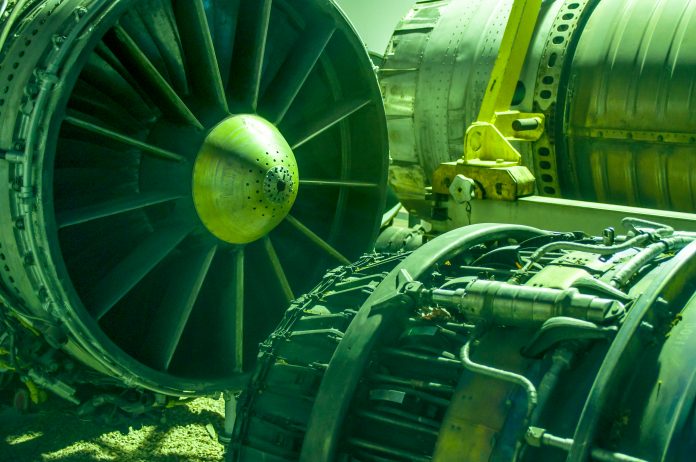Dr Simon Blakey talks us through The NewJET project pioneered by the University of Birmingham, which is creating Sustainable Alternative Fuels for aviation
A thriving aviation sector sits at the heart of the UK’s vision for a global and connected Britain. Aviation and aerospace contribute more than £22 billion a year to the UK economy, supports half a million jobs and is recognised as the second largest aerospace sector in the World1. R&D in electric and hybrid aircraft technology is essential in the journey to decarbonise aviation, but will be realised initially in short haul travel. Medium and long-haul aircraft, whose emissions account for 97% of UK aviation emissions2, will remain dependent on liquid fuel for the foreseeable future.
Environmental and societal challenges
The expected growth of the air transport industry will create significant environmental and societal challenges over the coming decades. By 2050 the number of commercial flights landing and taking off in Europe is forecast to be 18.6-26.1 million per annum which is 2-2.7 times the number of 20123,4. Much of this growth is likely to be accommodated by existing large hub airports, and growth where capacity is available. In doing so, new communities may be exposed to an enhanced level of aircraft exhaust emissions through changes in local air quality.
As aviation is a global, cross-border transport sector, both UK national and international regulatory and policy making bodies are seeking to ensure that growth within the sector is achieved with a minimum impact on the environment and whilst maintaining the safety of flight. Research into reducing the environmental impact of flight has previously centred on improvements in airframe and engine design coupled with improved Air Traffic Management. As increasing levels of Sustainable Aviation Fuel the composition of the fuel itself should be used as an enabler of further benefits.
NewJet Network+
Led by the University of Birmingham, along with, Sheffield University, Manchester Metropolitan University, Herriot Watt University, Cardiff University and Aston University, the NewJet Network+ is one of the 5 low carbon transport networks funded by the EPSRC and will bring together an innovative research community, focused on exploring the advantages offered by the increasing levels of low carbon, synthetic fuel or modified conventional fuel production beyond the existing fuel specification. The network will create a forum (free from commercial restraints that would limit freedom of forward and more strategic thinking) where an exploration of a new jet fuel specification for 2040 and beyond can be investigated. It will specifically focus on the improved performance over conventionally refined, fossil fuel feedstocks and the design of aircraft and engines that can maximise benefits from such fuels.
The goal of NewJet is to provide new understanding and insights into the benefits and barriers to a new fuel specification by 2040. The outcome of NewJet will be a virtual centre of excellence linking the chemical properties of a fuel to improved performance properties. This approach will have parallels in the marine sectors and is consistent with UK government plans to become world leader in low emission technologies.
CO2
We believe that intervention at a whole system (cross industry) level will help provide a platform for discussions as to the possible benefits of a new fuel specification for conventional and sustainable alternative fuels – in terms of CO2 reductions, but also more widely, the non-CO2 benefits, performance and cost of ownership. This activity is important now as it builds on several key drivers: i) The potential opportunities demonstrated by synthetic fuels. ii) Recognition that while aircraft and engine technology continues to advance with each generation, fuels remain essentially the same as when first standardised in the 1960’s. iii) Jet fuel is rapidly becoming a design, performance and emission profile limiting factor for future generations of engines and airframes.
Many of the policy and regulatory and bodies have traditionally looked at engine and airframe technological solutions to reduce emissions rather than through a review of the constituent components of the fuel, which has a large impact on the non-CO2 emissions5. As such the NewJet Network represents a disruptive approach to decarbonise aviation and has been conceived to respond to the emerging regulatory challenges and enhance UK capability for the development and assessment of new low carbon and advanced higher performance synthetic liquid fuels for use within the Aviation sector.
Step Change
In the mid to long term radical solutions are needed, as we require global net negative emissions by 2050 to maintain a reasonable chance keeping a global temperature rise this century below +2°C above pre-industrial levels and to pursue efforts to reduce this increase even further to +1.5°C. To date aviation fuel is viewed as a commodity and the focus has been on providing “drop-in” fuels. However, the energy required to upgrade and deoxygenate these fuels to meet this restriction has a significant impact on their carbon balance. The use of such a narrow range of hydrocarbons from biomass limits the quantity of fuel that can be produced per unit of available land. Stretching the boundaries of the fuel specification and moving the debate to the fuel as an enabler of change has potential to offer much greater decarbonisation impacts.
Technology response
Aircraft, aircraft engines and aircraft fuel are a system together. The reliance upon improvements in hardware to deliver all of aviation’s efficiency savings is deficient. A systems approach where fuel technology is given due consideration is needed. However, new understanding of the full impact of fuel compositions is required. Levering upon developments in sustainable alternative fuel technology and the associated modifying of the chemical physical and performance envelope, the added value and potential of fuel chemistry is beginning to emerge. The development of this knowhow will escalate the rate at which new low carbon fuels progress to market.
Supply chain
The supply chain for conventional aviation fuel is closely linked to that of diesel and petrol. The target of manufacturing only electric cars in the UK by 2040 will be an opportunity for new hydrocarbon process technology as the refining industry adapts to a different product slate. For future aviation CO2 goals to be delivered, the availability of sufficient volumes of affordable alternative energy sources is paramount. Consequently, a significant lead-time is necessary for the industry to plan and adapt, therefore understanding any specification requirements need to be well in advance of change.
Expected impacts: These policy and regulatory authorities are currently ignoring the potential which may be offered by an adjustment to the fuel specification to take advantage of the sustainable alternative fuels produced by alternative sources. The need for timely dialogue given the timescales for such a change is recognised. Such a dialogue Building on the state of the art, the NewJet Network will initiate discussions around the risks and benefits of such a change through.
The network will be running a series of workshops between now and 2022 to numerate the costs and benefits of this change in specification and to develop a roadmap for its implementation. Please stay in touch with the projects progress via the cut carbon website where further details of the programme will be announced (https://cutcarbon.org.uk/).
References
1. DfT (2018) Beyond the horizon: The future of UK Aviation. Next steps towards an aviation strategy
2. Calculated from DfT Aviation forecast 2017, available at: https://www.gov.uk/government/publications/uk-aviation-forecasts-2017
3. Eurocontrol Challenges for Growth 2013, available at: http://www.eurocontrol.int/sites/default/files/content/documents/official-documents/reports/201307-challenges-of-growth-summary-report.pdf
4. Flightpath 2050 Europe’s Vision for Aviation, (2011), ISBN 978-92-79-19724-6, available at: https://ec.europa.eu
5. Blakey S, Rye L & Wilson CW (2011) Aviation gas turbine alternative fuels: A review. Proceedings of the Combustion Institute, 33(2), 2863-2885
*Please note: This is a commercial profile











